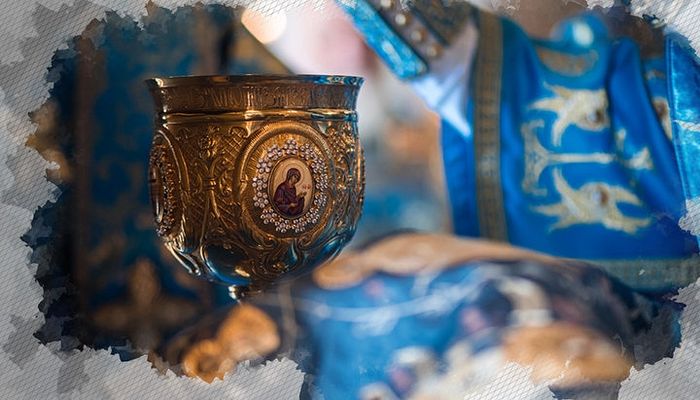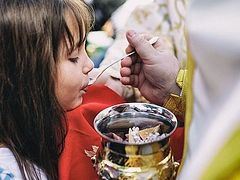Due to the epidemic of the coronavirus, a growing number of believers are asking the question: is God performing an “everyday miracle in secret” and preventing the spread of the virus in the Church, or not?
In recent days, both domestic Ukrainian, and international news sources have been replete with reports of coronavirus. We will not examine the various conspiracy theories spread across all these sources, but rather take a specific look on another topic: The impact the coronavirus epidemic is having on our religious outlook.
In an article [in Ukrainian and Russian], we discussed that the Church, in principle, has never opposed hygienic measures designed to stop the spread of dangerous infections. Moreover, it is the Bible which became the first source from which a person received information on how to resist disease.
Scripture emphasizes a direct correlation between moral purity and the absence of disease. That is to say, the cause of illnesses—most often the sinfulness of man—and the healing of illnesses—must begin with repentance.
This does not mean that believers in God should refuse medical assistance! On the contrary, they should accept it, and treat the doctor with due respect—as an instrument of God’s providence. However, medical treatment in a religious perspective, is not complete without spiritual correction.
Today, in the church environment, and the environment around the church, we are witnessing a question of import, when people are trying to determine whether coronavirus (or another infectious disease) can be transmitted through the Holy Mystery of Christ. Given the current situation, the question is not at all an empty one. And not only from a medical point of view, but also, first of all, from a religious one. That is why believers have been divided into several camps, in an attempt to answer this question.
The Traditionalists: Communion can not be a vector of infection. Any other point of view is sacrilege.
The representatives of the first camp (the majority), let’s call them “traditionalists”, believe that the Body and Blood of Christ cannot be the cause, source, or transmitter of disease. Rather, in the Twelfth Prayer of St. John Chrysostom before Holy Communion, we hear the words, “May my partaking of these Holy Mysteries of Christ be not unto judgement or condemnation O Lord, but to the healing of soul and body…”
The logic of the traditionalist camp is simple and understandable—Christ himself is in the Chalice, and therefore, it is impossible to get sick from touching Him. After all, the Bible says that the Lord healed the lepers, the sick with various ailments, and even touching His clothing restored health. Otherwise, if the Body and Blood of Christ can transmit infection, then communion is just “fiction”, a pretty rite that is, nonetheless, “unhygienic”, and in some cases possibly harmful.
We live in a secular society, in which we have lost almost all our moral guidance; our belief in God is becoming like a hobby, or a Sunday spectacle. And if the real effect and power of the sacraments is now doubted, there will be no function for the Church other than psychotherapy. Simply put, the Church will not be able to offer a person a real, genuine, and not illusory union with Christ. The words of Protopresbyter Alexander Schmemann, “The Church is a wall built around Communion”[1] will lose their meaning. After all, if there is no Holy Communion, then the Church is not needed—there are enough psychoanalysts.
One of the most unmovable positions on this issue was expressed by the Holy Synod of the Orthodox Church of Cyprus, which considers it blasphemous “to think that the body and blood of Christ can transmit any disease or virus.” The Bishops explain: “Based on the centuries-old experience of Christianity, there is no evidence of such a transmission. Priests who serve in the infectious disease wards of hospitals, and commune these patients eventually consume the rest of the Holy Communion themselves—using the same spoon. No priest has been infected in these cases.”
It is especially emphasized that, “The reception of the sacrament of Holy Communion comes with a faith that protects against any danger. Participation is voluntary. No one is forcing. If one feels that he wants to abstain from the sacrament at this time, he is free to do so.”
The Holy Synod of the Russian Orthodox Church, in its address on the situation with the coronavirus, recalled that, “In times of epidemics, the Russian Orthodox Church always carried out its service without denying anyone spiritual care, and full participation in the Sacraments.”
The Holy Synod of the Church of Greece declared that, “The faithful will continue to receive Holy Communion as usual…” because it “can never be a cause of infection…” because communion “even in the midst of a pandemic, is a manifestation of love that overcomes everything…” including fear.
At the same time, the Holy Synod “does not condemn those who are afraid to participate in Holy Communion, but clearly declares the faith and urges…” participants in the public debate “…to respect this faith, and the free choice of the people to continue to participate in the Sacraments of the Church.”
Similar positions have been made in the Bulgarian and Georgian Orthodox Churches, as well as the Church of the Czech Lands and Slovakia.
“Liberals”: Communion can be contagious
Representatives of the opposing camp, let’s call them “liberals”, believe in the opposite—a common cup, from which all the participants receive communion, can cause disease to spread.
Thus, according to the opinion of the director of the Superior Institute of Religious Sciences of St. Thomas Aquinas in Kiev, Catholic priest Peter Balogh: “Communion is the Body and Blood of Christ in the form of bread and wine. These forms, constitute everything without the exception of the properties of these products. So, they [meaning the accident of the product according to Aristotelian metaphysics—Trans.] can be spoiled, inedible, poisoned or, in fact, infected by bacteria or viruses.”
With this statement, he also makes a theological argument: “The speech of some that Communion cannot transmit diseases or viruses is, classically speaking, monophysitism; that is, a heresy of the first centuries of Christianity, when some did not believe in the reality of Christ’s Incarnation, or even if they believed in the Incarnation, they claimed that the human nature of Christ was absorbed by His Divine nature, or others saying that the different manifestations of the Person of Christ are only an illusion.” In conclusion, he compares Communion… to a sandwich: “Communion can be infected with a virus just like a sandwich or juice with a virus.” In addition, Balogh gives several examples of how popes were killed by poison being put in the chalice, and even priests and monks died during the plague.
Peter Balogh’s comrade in this matter is the “stateless cleric”[2] of the ROC Kirill (Govorun), who is also convinced that through Communion, viruses can be transmitted. However, unlike his associate, Govorun considers the opponents of the idea of infection by a common cup, not to be monophysites, but docetists: “Yes, the virus can be transmitted through a common cup. To think otherwise is a docetic attitude towards the Gifts. Everyone who comes to the chalice must be aware of it, and make a decision: to receive or not, based on this understanding” (that a virus is transmitted through the chalice.)
The Archimandrite emphasizes that “to deceive people and themselves, by invoking faith, promising that nothing will happen, is theologically wrong, as well as irresponsible, and may even be criminal.” However, he does not refuse to consume the gifts: “For example, I am well aware of this and, nevertheless, I consume the gifts after each and everyone.”
A similar point of view was expressed by the ex-priest of the Ukrainian Orthodox Church Georgy Kovalenko, according to whom “God should not work as a filter for water purification during the feast of Theophany or a disinfectant during a pandemic.”
Not surprisingly, the same is the position of the ROC Protodeacon Andrei Kurayev, who cites as a proof of his point of view, the words of St. Nicodemus of the Holy Mountain from The Rudder, also called the Pedalion or the Book of Canon Law. Thus, in interpreting the given Interpretation of the 28th Canon of the Sixth Ecumenical Council, St. Nicodemus writes:
“Hence both priests and prelates must employ some shift in time of a plague to enable them to administer communion to the sick without violating this Canon; not however, by placing the Holy Bread in currants [i.e. “Grapes” in the 28th canon—O.C.], but in some sacred vessel, so that the dying and the sick may take it, thence with tongs or the like. The vessel and the tongs are lo be placed in vinegar and the vinegar is to be poured into a funnel, or in any other manner that they can that is safer and canonical”[3]
However, these words of St. Nicodemus do not shed any light on the problem, because 1) it is unclear what are these “grapes” in question; 2) why the priests put the Holy Bread (in the original Greek: Arton Agion) amidst these same grapes; 3) why should the Holy Bread be placed in a vessel separate from the grapes, and not in the cup with the Blood of Christ? Moreover, St. Nicodemus gives this rather complicated scheme of action during the plague, in the interpretation of the 28th rule of the Sixth Council, which directly forbids the combination of grapes with the Bloodless Sacrifice:
“Since in some regions, in accordance with a certain custom, some persons used to offer grapes at the Holy Table, which the priests would combine with the intemerate mysteries and then impart both together to the laity, on this account and for this reason the present Canon from now on and henceforth commands that no priest shall do this, but, on the contrary, he must give the Holy Communion alone to the worthy, for vivification, and for remission of their sins.”[4]
So, it appears that St. Nicodemus opposes this custom only during times of plague, and on other days, the addition of Holy Bread to the grapes is permissible? And maybe, in this case, about the Artos,[5] and not the Eucharistic Bread? Be that as it may, the quote cited by Father Andrew leaves more questions than answers.
The Cautious: All according to your faith
As we can see, the position of the Catholics and the “Liberal Orthodox” is unconvincing; and rather balanced on the brink of sacrilege. In contrast, the traditional approach to the Sacrament of Holy Communion rejects even the idea that it may serve as a source of infection by some disease. To the contrary, traditionalists believe that through the Body and Blood of Christ, man receives healing.
There exists, however a third point of view. Proponents of it believe that everything depends on the faith of the communicant. In other words, if they believe that they may get sick, it means that they are better off refraining from communion from the Common Chalice, or to partake with a spoon they bring with them (this was the view expressed by the Synod of the Romanian Church).
Metropolitan Anthimos of Alexandroupoli of the Patriarchate of Constantinople (and New Territories of Greece)[6] says, “Holy Communion requires faith. There is nothing “magical” about Holy Communion. Depending on our faith, it will do no harm. But who can measure one’s faith? If you have great faith, you can walk the waves from Alexandroupoli to Samothrace. But if not? We must receive Holy Communion with faith, not as an act of boasting. Purification goes to the soul… But if God wants to test us?”
The Albanian Church, which suspended all daily worship services except the Sunday Divine Liturgies until early April, has cautiously addressed the existing problem, calling on the faithful to pray at home or alone in churches, which for this reason will remain open throughout the day.
So, who is correct?
To Commune or not to Commune?
To be honest, it is very difficult to answer this question. Simply because modern man is too weak to accept what has been said with all responsibility. Indeed, we lack faith, we have many spiritual problems, and with each passing day, there is more and more. And so, in the matter of communion, we give everyone the right to decide for themselves. There is a teaching of the Church, there is a traditional and opposite view, the choice is yours.
There are many indications that the Sacrament of Holy Communion cannot serve as a source of infection. Many priests carry out their ministry in places that are, from the point of view of hygiene or compliance with medical standards, not entirely safe. For example, for ten years, Father Klimenko had to receive communion from prisoners of the Berezani Correctional Facility, which housed people with HIV and tuberculosis and, after all the sacraments, to consume the Holy Gifts (i.e. to consume the Holy Communion left in the chalice). He did not get HIV or tuberculosis.
The spokesman for the Diocese of Zaporozhye, Archpriest Alexander Ovcharenko, estimated that he had consumed the chalice about 2600 times during his ministry.
The priest states: “It is known that absolutely different people with many diseases come to Church. On average, twice a year in Zaporozhye, there are epidemics of influenza and acute respiratory disease as a whole. I never got sick after consuming the Holy Gifts! […] Holy Gifts are a spiritual fire that burns away not only human sins—take my word for it!”
Deacon Irenaeus writes about this problem in a simple and convincing way: “During every Liturgy, both sick and healthy people commune as they wish. After each person, the spoon is immersed in the Chalice. And the rest of the remaining Gifts are consumed (eaten) by the deacon. As to the possibility of contracting diseases through Communion, simply put, as a deacon, I can say that we (deacons) just wouldn’t still be here. We would have long since died out like mammoths.”
In our world, a huge number of different viruses are transmitted both through saliva and airborne droplets. And it is not only about tuberculosis, hepatitis, syphilis, but also about other diseases, of which there are very many. Against this background, the Church would have long ago moved to such forms of communion that would maximally protect a person from various infections—disposable cups, disposable spoons, personal communion cloths (preferably disposable), hand and icon disinfectants—all of this would be in the Church… if infection were transmitted through Communion.
Yes, previously, no one dared to suspect the Holy Gifts of the possible transmission of infection, because even suspicion of icons could end in tragedy. Orthodox priest Ilya Solovyov gives a historical example of how people treated holy items during a terrible plague:
“We call to mind the plague epidemic in Moscow of 1771. The scale of the disaster was so great that the city was surrounded with newly made large plague cemeteries that arose around the Kamer-Collegium rampart: Pyatnitskoye, Danilovskoye, Kalitnikovskoye, Vagankovskoye, Dorogomilovskoye, Miusskoye, Rogozhskoye. Their total area was more than 76 acres. It is known that to prevent a mass congestion of people, Archbishop Ambrose (Zertis-Kamensky) removed an icon from the wall of Kitay-Gorod, around which many people gathered for prayers. All this aroused the indignation of the ignorant crowd. The bishop was chased down, he had to hide first in the Kremlin, and at night he was lowered in a basket from the Kremlin wall and transported to the Donskoy Monastery. But there he failed to protect himself from the brutal crowd. Upon learning of Ambrose’s stay in Donskoy, a crowd of thousands began to break into the monastery. Dozens of fists drummed into the monastery gates. Breaking through, people who lost their humanity rushed into the cathedral. Having found here the Bishop who took refuge in the choirs, they dragged him out into the street, behind the fence and… cut him down right at the entrance to the monastery. It’s scary to even remember this event.”
Of course, nothing like that would happen today. On the contrary, rather, you and I will witness the opposite—how an “educated” crowd would tear to pieces a priest who dared to commune the people during a coronavirus epidemic. The fear of this ailment is so strong that even the majority of Orthodox Greeks agreed not to take communion, so as not to get sick (71% of the population agree with this).
Already to some extent, it can be stated that the faith of the modern man is lost to technological advancement, the world, and its “values”. If Communion is no longer perceived as a medicine for the body, then its medicinal properties for the soul will very soon be in doubt. What will remain for modern man? What then can the Church offer him? A tradition? It is unlikely that such an approach can convince someone that his life needs to be changed for the sake of Christ. Indeed, if there is no Communion, then there is no Church.
Finally, the accusations of monophysitism and docetism to those who deny the unsullied nature of the Body and Blood of Christ are completely groundless. Simply because, “as Orthodox Christians, we believe that the Holy Eucharist is the Body and Blood of the Risen Christ.”
According to St. John of Damascus, “The risen Body of Christ has become unchanging, un-suffering, able to pass through locked doors, not tiring, not needing food, sleep or drink.” But it is still the human body, “which is described.” After all, having eliminated “decay”, that is, “hunger… and thirst, sleep and fatigue, and the like, the risen Lord did not remove from Himself any parts of the human nature, neither body nor soul, but he has both a body and a soul.” And then he continues: “I say this, not destroying the nature of the Body, but wanting to show the liveliness and divinity of it.”
Through the sacrament, we become, according to the words of St. Cyril of Jerusalem, “of one body and one blood with Christ”, the Risen One, which gives us hope for a personal resurrection. In the Gospel we read the words of Christ: Whoso eateth my flesh, and drinketh my blood, hath eternal life; and I will raise him up at the last day. For my flesh is meat indeed, and my blood is drink indeed. He that eateth my flesh, and drinketh my blood, dwelleth in me, and I in him. As the living Father hath sent me, and I live by the Father: so he that eateth me, even he shall live by me. (John 6:54-57)
At the same time, a person who does not want to receive communion puts himself outside the life that Christ gives him: Then Jesus said unto them, Verily, verily, I say unto you, Except ye eat the flesh of the Son of man, and drink his blood, ye have no life in you. (John 6:53)
Thus, the Sacrament of Holy Communion is simply necessary in order to achieve unity with Christ and salvation. Without this, our life loses its meaning and turns into an eternal pursuit of “benefits”, interrupted by periods of fear and horror from contemplation of what is happening around us. Coronavirus in this sense is not the worst thing that can happen to us. The worst thing is to stop being among those who are aspiring upward, and therefore to remain only food for worms.
Well, the choice to take communion or not to take communion is up to each of us. And no one will make this decision for us.





